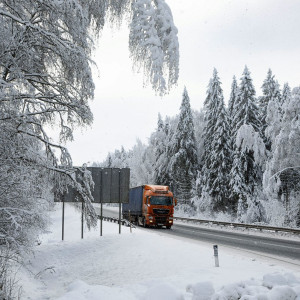New report: High fuel prices have made the Swedish road freight industry more productive


Fuel costs are a major expense for road freight companies. But how do the carbon tax, rising diesel prices, and biofuel blending requirements affect productivity in the road freight industry? In a new SNS report, three researchers show that emissions from the industry fell by 5 percent and fossil emissions by 30 percent between 2007 and 2020.
At the same time, turnover increased by 23 percent. In Climate Policy and Efficiency: Lessons from the Transport Industry[1], Gustav Martinsson, Per Stromberg, and Christian Thomann examine how Swedish climate policy instruments--the carbon tax and biofuel blending requirements--have affected productivity, greenhouse gas emissions, and industrial structure in the sector from 2007 to 2020. During this period, diesel prices in Sweden rose sharply, mainly due to climate policy measures.
As a result, carbon emissions from the industry fell by 5 percent, while real turnover increased by 23 percent. Including the use of biofuels, fossil emissions declined by 30 percent. - The clear conclusion is that policymakers do not have to choose between productivity and lower emissions in the industry.
On the contrary, rising fuel prices have created incentives for consolidation, better route planning, and more efficient transport, making the industry more productive, says Gustav Martinsson.
The report is based on unique microdata at the truck level, linked to firm-level data, which makes it possible to study the companies' adjustments in detail. The report concludes that efficiency gains have primarily been driven by improved logistics.
Higher fuel prices have also contributed to changes in the industry structure, with large road freight companies (more than 50 trucks) significantly increasing their market share. The researchers welcome this restructuring due to its climate benefits. - It is necessary that more productive firms grow at the expense of less productive ones.
Larger trucking companies have also been able to reduce their emissions much faster. If smaller companies are to receive financial support, it should be for transition and productivity improvements--not for preserving less productive and more emission-intensive operations, comments Per Stromberg. The biofuel blending mandate was reduced in 2024, and since then, diesel prices have fallen by about 20 percent.
The researchers argue that uncertainty surrounding policy instruments risks weakening the industry's incentives to invest in climate and efficiency measures, whether in improved logistics or new technologies. - It is important that emissions are priced and that the price reflects the social cost of emissions. For the industry, stable policy conditions are crucial to enable long-term investments in their businesses, concludes Christian Thomann.
Policy recommendations: o Increase predictability: Climate policy must be long-term and stable to stimulate investment. o Maintain cost incentives: Whether through taxes or blending mandates, fuel costs must continue to reflect emissions. o Encourage consolidation: Structural shifts toward more efficient operators can boost productivity and reduce emissions. o Support technology-neutral efficiency: Efficiency gains should be encouraged regardless of whether they come from logistics improvements or new technologies. o Prepare for EU ETS2: Anticipate future cost increases under EU climate policy to ensure Swedish trucking companies adapt in time.
Effects of fuel prices on productivity and emissions (excerpt from the report): A 1% increase in fuel costs leads to: o 0.6% higher productivity on average. o 1.5% higher productivity in large road freight companies.
o 0.3% lower carbon emissions per unit of turnover on average. o 0.8% lower carbon intensity in large road freight companies. About the authors
Gustav Martinsson is Professor of Financial Economics at Stockholm University Contact: [email protected][2] / +46 8 16 30 26 Per Stromberg is Professor of Financial Economics at the Stockholm School of Economics
Contact: [email protected][3] / +46 8 736 91 19 Christian Thomann is Associate Professor of Business Administration at KTH Royal Institute of Technology Contact: [email protected][4] / +46 8 790 67 75
About the report
Climate Policy and Efficiency: Lessons from the Transport Industry[5] is part of SNS's research project The Green Transition and Business.
The project contributes knowledge and insights to discussions on how to harness the business sector's potential in the green transition.
References
- ^ Climate Policy and Efficiency: Lessons from the Transport Industry (www.sns.se)
- ^ [email protected] (www.mynewsdesk.com)
- ^ [email protected] (www.mynewsdesk.com)
- ^ [email protected] (www.mynewsdesk.com)
- ^ Climate Policy and Efficiency: Lessons from the Transport Industry (www.sns.se)